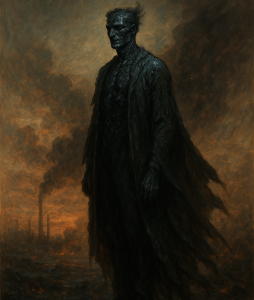A Father’s Loss
4 min readThe father stared into the fire-pit’s glowing embers. Flames twisted and snapped against the blackened lava stones, flickering like the last remnants of something lost. The grill, an artifact of forgotten cookouts, sagged under the heat, its once-silver steel warped and rusted, like the worn emotions of its keeper. His left hand clutched a rusty grate cleaner, bent and broken, a useless thing in his calloused grip.
He turned, his eyes filling with the un-shed weight of tears, toward the house behind him. The window, a cracked and smudged pane, gazed back at him, frowning, the glass dark and empty like a dead stare. It snarled in silence, seeming to whisper with its own loneliness. The house, it seemed, was waiting for something that would never return.
He moved to the backdoor, its wood swollen and stiff, resisting him as though it, too, resented his presence. With a grunt, he yanked it open, the sound of the door’s pop an unwelcome intrusion into the stillness. As he stepped inside, the house exhaled—a long, weary sigh, almost as if relieved to finally share its grief. The walls bent inward as if crushed by the weight of time, their surface peeling like tired skin. The ceiling rippled, sagging, and the floor beneath his feet groaned as though it could no longer bear the burden of being walked upon.
Each step he took sank into the wooden planks, the floor dipping and warping like the ground beneath his feet had forgotten how to hold firm. The murky brown of the wood seemed darker, as though the shadows were pooling there, turning the floor into something desolate, forsaken. He could almost feel the heartbeat of the house, faint and irregular, as if its pulse, like his, had slowed with each passing day.
The kitchen lay ahead, a hollow echo of the life it once held. The fridge was anchored to the wall like a gravestone, its waterspout broken and useless, dripping endlessly into a stagnant pool on the cracked tiles. The sink—dry, its surface caked in lime—stood neglected, its emptiness mocking him. The countertops, scraped and gouged, had become pointless expanses, relics of usefulness stripped away.
He turned away from the kitchen, stepping into the living room. It was a room without warmth. The television lay flat on the floor, dead and glassy-eyed, surrounded by the dust of neglect. The couch sagged, its cushions flattened and misshapen, like something that had given up on comfort long ago. Where there had once been rest and laughter, now there was only silence—thick, heavy, unbreakable. The fireplace held nothing but cold, its hearth charred and cracked, blackened bricks slumping inward as if mourning the warmth it once contained.
The father hesitated at the foot of the stairs. The steps groaned under the pressure of his weight, each creak a reminder of something worn down, aged by loss. He ascended slowly, step by step, the house following him with its own groans, like a creature burdened by grief it could never voice.
At the top of the stairs, he turned into the hallway. The walls here were chalky, stained with the years of hands that had once touched them but no longer did. A painting hung on the wall, once vibrant, now fading, its frame scratched and crooked. It looked out of place, like a memory struggling to stay intact in a house that had forgotten what memories were.
The door at the end of the hall stood closed, holding a sign that once read “Beware of the Nasty Rats.” Now, the sign was curled, the edges yellowed, and its letters faded like they had been eroded by time itself. The paper fluttered slightly, making a soft rustling sound—like the whisper of something long lost, drifting on a breeze that no longer existed.
He pushed the door open, its hinges squealing as though reluctant to reveal what lay beyond. Inside, the room was swallowed by a deep, oppressive darkness, despite the faint flicker of a broken light overhead. The bed, which once held the laughter and warmth of his daughter, now lay twisted, its mattress slumped and bent, frowning as if in pain. On the dresser, a porcelain horse—once a proud symbol of his daughter’s joy—now lay fragmented, its glistening surface dulled and cracked, its gallop frozen in time, forever interrupted.
The room, like the house, had become a tomb—one that held no rest, only the haunting echo of what was no longer there.






